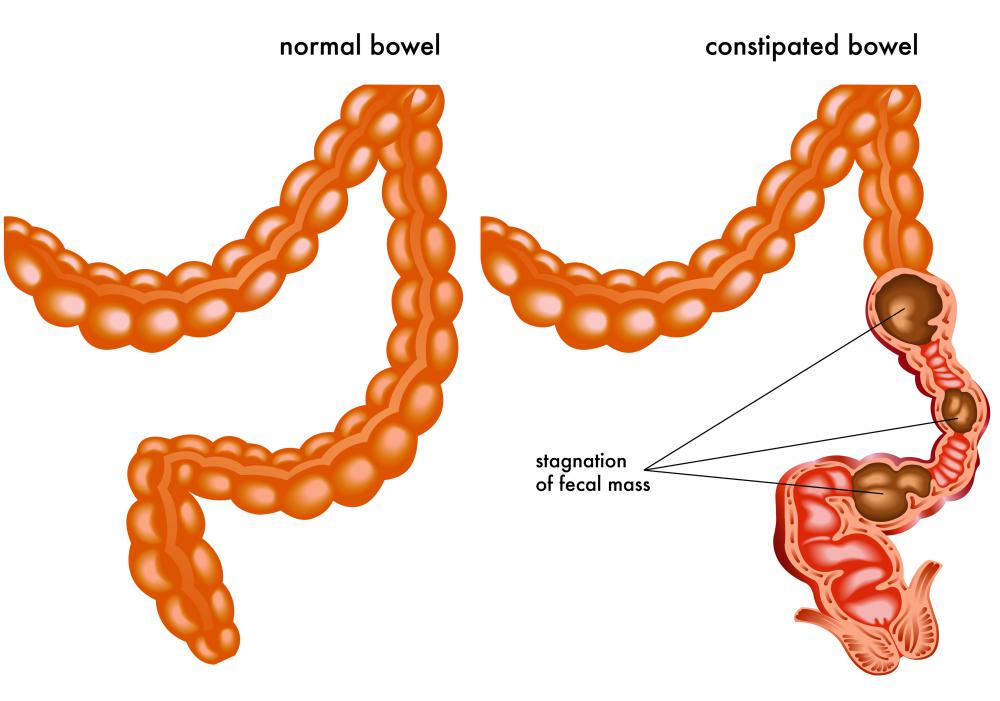At WiseGEEK, we're committed to delivering accurate, trustworthy information. Our expert-authored content is rigorously fact-checked and sourced from credible authorities. Discover how we uphold the highest standards in providing you with reliable knowledge.
What are the Different Types of Intestinal Symptoms?
Different types of intestinal symptoms often result from a variety of possible problems. Symptoms can range from intestinal pain to bloating, a swelling of the abdomen, and include constipation, cramping, and diarrhea. Other symptoms may be noted as well, such as rectal bleeding and pain, dark stools, nausea, and vomiting. Persistent intestinal symptoms could indicate a serious medical condition and should not be ignored.
To determine an exact cause of the intestinal symptoms, a healthcare provider may order laboratory tests that could include blood work or stool samples. He may require a series of upper and lower gastrointestinal (GI) tests, and use both the lab results and x-rays when diagnosing. The laboratory tests can identify if an intestinal infection is present, as could be the case with diverticulitis, colon polyps, or intestinal parasites. The GI series x-rays can reveal if there are, in fact, polyps or diverticula present in the colon, as well as show other possible causes for the intestinal symptoms.

Intestinal symptoms that include bleeding are commonly associated with an intestinal infection and inflammation, or cancer. The symptoms may be overt, as would be the case with bloody diarrhea; however, the bleeding is not always apparent and may only be discovered by a stool sample test. Constipation can lead to blockage in the intestines, and diarrhea can lead to dehydration; both symptoms can cause severe intestinal pain. Nausea and vomiting may also be present with any of these GI conditions.

An intestinal infection can be the cause of many acute GI or digestive problems. Infections can occur when someone is exposed to intestinal parasites in food or water, or when parasites enter the body from other sources. Infections are either viral or bacterial, as is the case with parasites. Serious problems may result, such as appendicitis, even death. In the elderly, intestinal symptoms are more frequently ignored, and infections account for a significant number of deaths in this group.

Intestinal inflammation can be painful, and the intestinal symptoms associated with this GI difficulty mimic many of those related to intestinal infections. Bloating or feelings of fullness, however, are symptoms associated with inflammation. Gassiness and swelling in the intestines can be debilitating, and these symptoms are often associated with various types of inflammatory bowel diseases (IDB).

When a patient experiences intestinal symptoms, keeping a log of symptoms and times as they occur may be beneficial. Tracking all symptoms can be useful, no matter how minor they may seem. The log may assist in determining pattern and time frames for different or same symptoms in the event testing becomes necessary.
AS FEATURED ON:
AS FEATURED ON:


















Discussion Comments
I have been having numerous tests done due to a burning pain in my lower abdomen that literally keeps me bed ridden in a curled up position. I vomit and get a cold fever and when I try to drink water or anything it don't stay down, and it only lasts 24 hours but it's happened three times and it's been one time a month, it seems.
I have lots of blood in my stool and I'm only 30 years old. I will be going for a colonoscopy next but I've already had an ultrasound of my abdomen and ovaries and they found cysts on my ovaries but that can't be what's making me sick. The blood tests came back OK and so I did the stool sample test and also I was given a breath test to see if there was bacteria in my tummy and that came back OK too so I hope to find what's wrong soon before it's too late.
Post your comments